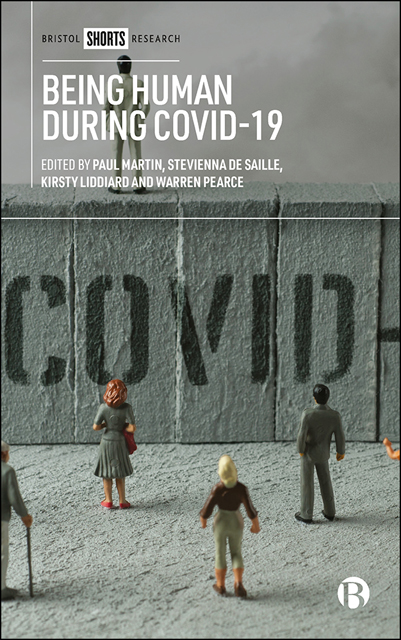nine - Pandemic Satire and Human Hierarchies
Published online by Cambridge University Press: 13 October 2022
Summary
Q: Why don’t chefs find coronavirus jokes funny?
A: They’re in bad taste.
Jokes and political satire have not been on lockdown during the COVID-19 pandemic. Books, blogs, memes and one-liners abound, all poking fun at the terrifying and deadly matter of the viral scourge that has killed millions of people around the globe. Disabled and older people, especially those who are poor and/or racialised, have been hardest hit by the pandemic, and have also been made the targets of Western racist humour, as well as anti-racist satire. My particular concern is with the paradox of politically woke satire carrying out its critique through the denigration of disability. Such political satire exposes racist and bogus beliefs circulating in the pandemic, but it does so by using terms that reference, sometimes with vehement hatred, disabled people. This is more than blaming the victim; it fails to acknowledge how social responses to the pandemic have had a devastating effect on disabled people, who account for six out of ten COVID-19 deaths (Aljazeera, 2021). Through an analysis of one example of this common satirical trope, I aim to show that a critical disability studies perspective can awaken political imagination by not reproducing traditional hierarchies of humanness.
Consider this:
Outbreak
TORONTO – REPORT: OUTBREAK OF IDIOCY SPREADING 10000 TIMES FASTER THAN CORONAVIRUS
Public health officials in Toronto have confirmed its first 50,000 cases of being a misinformed fuckwit as xenophobic conspiracy theories and tales of false cures continue to spread across social media.
“Becoming a complete moron during an infectious disease outbreak is far more viral than we first thought,” said Dr Jeanne Smith of Toronto Public Health. “Fact resistance is abnormally high especially among the dullard population, and the bottom 5% of your graduating high school class.”
Tens of thousands of people were affected by a novel fake news claim that the Chinese government was developing coronavirus at Canada’s National Microbiology Lab leaving at least 10,000 people stupider. Patients are usually asymptomatic until they open their mouths or start tweeting.
Aunts spreading rumours about 100% natural cures for the virus on Facebook have been quarantined while racist uncles at dinner tables were ball-gagged as a precaution.
- Type
- Chapter
- Information
- Being Human during COVID-19 , pp. 75 - 82Publisher: Bristol University PressPrint publication year: 2022



